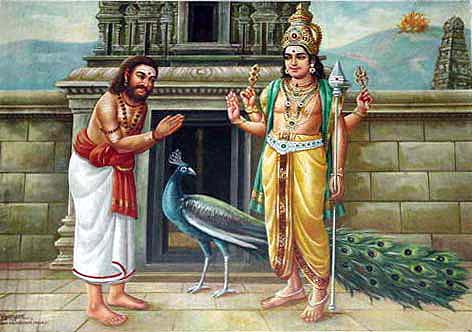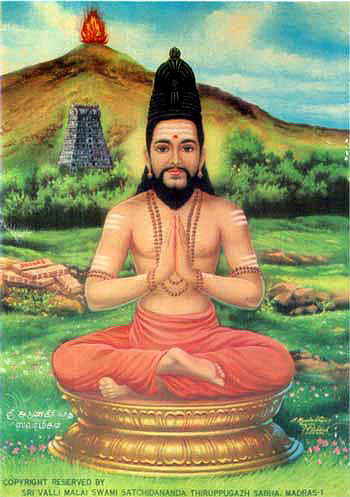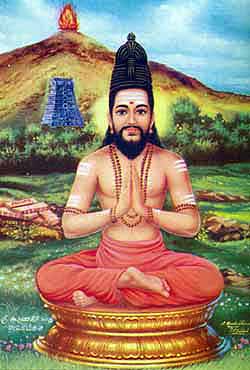
|
||||||||
|
| ||||||||
Biography of Saint ArunagirinatharBy Swami Anvānanda
|
 |
| Arunagiri worships Lord Murugan who had just rescued him from certain death by suicide. Painting from Tiru Avinankudi Tirukkovil, Palani. |
The first sign of God's grace and compassion came to Arunagirinatha after a Mahatma sought him and spoke to him in a sweet voice with love and affection. The Mahatma advised him "to meditate on the six-faced God Shanmukha".[8] But Arunagirinatha did not heed the advice for some time and people began to deride him for ignoring the advice of the Mahatma. A change soon came over him. He began to worry very much over his pitiable state. He thought of the advice of the Mahatma and attempted to spend some hours in meditation facing the image of Lord Muruga installed in the Gopuram. But his will, weakened by his immoral life, lacked the strength to persist in that attempt. The crisis in his life started mounting up. He decided to surrender, at the feet of Lord Muruga, the body that had failed to serve Him in any way, He decided upon suicide. At this moment, Lord Muruga appeared standing on a dancing peacock, halted him in the act and took possession of him.[9]
"Oh Gurunatha! You came along on the peacock holding the Vel that broke to pieces the Krauncha Mountain in Your hand and took possession of me in that the people of the world may admire Your grace."
"When I was about to shed life from my body, out of compassion for me and to elevate me to a better and praise-worthy status, You came upon the scene, dancing, accompanied by Your celestial devotees and showered grace on me."
One must assume that after this surrender to Lord Muruga that was accepted by Him, the lure of lust should have left Arunagirinatha. For, if surrender to the Lord does not relieve one instantaneously of all dross, then surrender will have no meaning. One may safely assert that after Arunagirinatha was taken possession of by the Lord, all prayers in his songs thereafter seeking to be relieved from the attraction of lust are for the benefit of others and not for himself.
Here, one must pause for a moment. Was Arunagirinatha's decision to end his life born of mere disgust and frustration, a simple attempt at suicide, in order to put an end to suffering, which can no longer be endured? One must remember that God does not intervene in every instance of attempted suicide to save the person. The manifestation of Lord Muruga standing on his dancing peacock is not an every day occurrence. It is not vouchsafed even to His most sincere devotees. Yet Arunagirinatha the dissolute was rewarded with this supreme act of compassion.
In our sastras, it is said that the state of mind of a person at the last moment when life is about to leave the body, is very important from the point of view of his rebirth. If one were to utter the name of Narayana or Shiva and fix his mind on His form at the time of death, he is assured of moksha and release from rebirth. Arunagirinatha had realised with great poignancy that the body had failed to serve the purpose for which God had intended it. He had misused it for immoral purposes. What was there left for him to do except to surrender the mind and the body to the Lord? He sings thus:[10]
Oh mind of
mine!
Trust not the
body
That infernal
machine
Turning out
pleasure and pain.
Brahma who
sits on the Lotus
Created it to
bind the mind.
Oh mind of
mine!
Free thyself
from fear.
To seek Him,
endeavour
Patiently and
steadily.
Let us go to
Him
Show our love
and surrender.
Oh mind of
mine!
It's good you
decided to surrender.
See Him on His
peacock Vahana
He has now
taken charge of you.
Doubt not,
there is no Greater State.
Dwell on His
holy name
Always,
‘Mainda, Kumara'.
A kshatriya warrior of old, leaving his house, his wife and children and relatives and abandoning all his desires and possessions, goes to the battlefield with the assurance that if he should die there, he will attain Vira Svarga (Valhalla). Similarly, a great bhakta is always prepared to sacrifice a limb or an eye or even his life for the sake of God in the full belief that the Lord will accept the sacrifice and make him one of his possessions. Lord Muruga came to the rescue of His devotee who was preparing to shed his body and saved him not only from death, but accepted him as dear to Him and took possession of him. How beautifully Arunagirinatha has expressed it when Lord Muruga appeared before him!
Kinkini thith thimi, thith
thith
The anklets on
the dancing feet jingled,
A sound that
to other sounds
Closed my
hearing.
The Kadamba
garland that He wore
Suffused me
with its cloying fragrance,
And my breath
was held.
His moon-like
countenance and tender smile
Caused such
cheer and ecstasy
That my mind
was lost.
For a moment
He looked at me,
A cool liquid
light poured out
From His long
lotus eyes.
It filled my
heart tasting like nectar
And I was lost
to Him forever.
End Notes
[1] Tiruppukazh: "kāthala mungkuRi…"
[2] Tiruppukazh: "irukanaka māmeru…" and "aRivillāp piththar…"
[3] Tiruppukazh: "nāthapinthuka lāthi namo nama"
[4] Tiruppukazh: "thāthala mungkuRi…"
[5] Swami Anvananda, Saint Arunagirinatha, (Madras: Pongi Publications, 1975) pp. 41-45 (Chapter V: ‘The Lure of Lust')
[6] Tiruppukazh: "arivillāp piththar…"
[7] Tiruppukazh: "manaiyavaL nakaikka…"
[8] Tiruppukazh: "kamala kumiLitha…"
[9] Tiruppukazh: "arivaiyar nenjuru…" and "kothi muDiththu…"
[10] Tiruppukazh: "antho manamey…"

